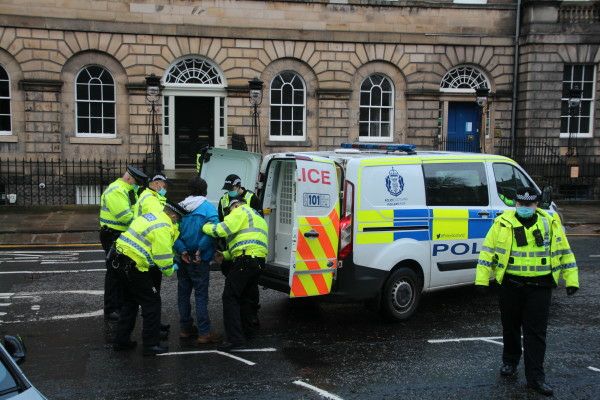
Whoever thought before Covid that we’d use the terms ‘Stockholm syndrome’ or ‘Munchausen by proxy’ to refer to our friends or family? And who knew they’d think of us as dangerous enemies of the state? But it seems they are half right, for we are enemies of the state — as we refuse to agree, or to comply. But we are not dangerous; the state is.
We once took our freedoms for granted. Not now. Now we feel the fear, the nightmare, generated by our very own “domestic terrorists”. I refer to none other than Police Scotland.
“Will it be today, and how do we handle it?” is the only discussion on the drive to the protest. “Remember to write Dirty Bob’s number on your hand in case you lose your phone.” I’m sure Dirty Bob isn’t the best lawyer we could find, but his is the number we’ve got. We’ve decided not to give anyone a lift again; we don’t want the responsibility. I don’t want to go, but I know there’s no choice, it’s frightening, it could be today and we’ve spoken the words: “We’ll stand shoulder to shoulder and take what comes!”. It has the ring of a bad war movie, but then we are heading for the front lines.
We drive around the block to assure ourselves we won’t be alone. Police vans are everywhere, the street’s awash with fluorescent yellow vests and the adrenaline is palpable. Squeezing the rising panic and assuming an air of confidence is tricky; lamb-to-the-slaughter and deer-in-the-headlights is probably a more accurate description of the mood. “Don’t make eye contact and don’t engage!” is the instruction running through our minds while we’re trying to find our people.
We were utterly crushed and massively outnumbered that day; we didn’t manage to assemble. We were threatened, pushed around and intimidated. There was no actual violence but the air outside Edinburgh’s Parliament stank of it. We lost some of our people to the domestic terrorists, picked off on the walk back to their cars and the train station: singled out as easy targets in a thinned-out crowd. It took a while to dawn on me that the annoying woman whose voice was screaming in my ear to get out of there was actually me. We were terrorised on our own streets.

We were dispersed, but we avoided arrest — this time. And when we retreated to our ordinary lives in our ordinary homes with our ordinary neighbours, it was with the knowledge that we’ll need to be more strategic now.
Strategic planning, conflict and confrontation are terms we thought we’d never use; we’re simply ordinary people. They’re not the kind of words that would ordinarily come from the mouths of veterinary surgeons, social work managers, doctors, teachers, university professors, accountants and landlords. But we are changing; these people are becoming my new lockdown family. And together, we are learning to think differently. The old world, the old certainties and the old lazy assumptions are leaving us. Soon, we’ll meet up an empty office or under a dirty railway arch and we’ll plan how to do it a different way.
We know handing out free books with a smile doesn’t work, ever since that kindly lady of Dundee was bundled in the back of a riot van, carted off with her hands cuffed behind her back and charged with culpable and reckless conduct. No good deed goes unpunished now.
We will continue, we will learn, we will not give up. Our consciences won’t allow it. There must be a resistance. Life is precious, and to give up resisting is to give up on life.

